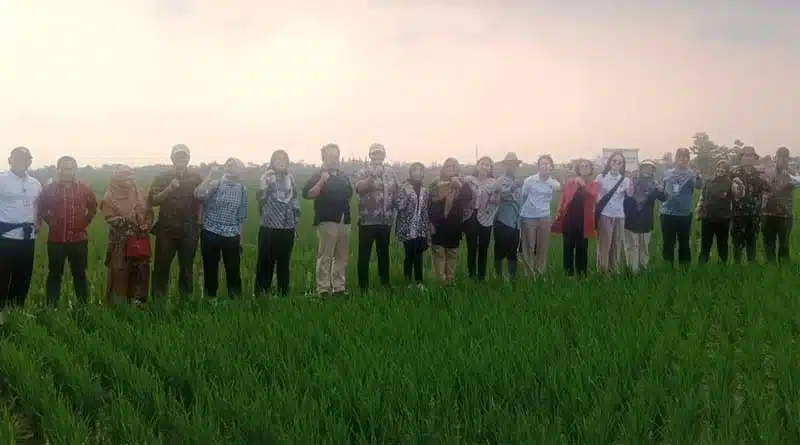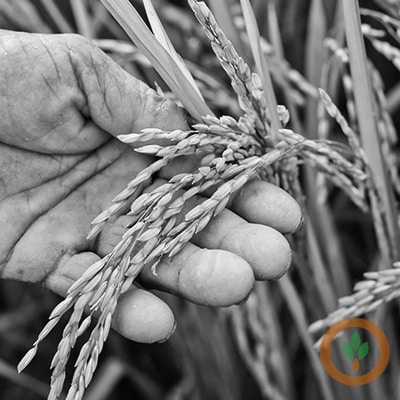Tags
A fascinating theory about the cultural influence of rice farming now has evidence of causality

New research published in Nature Communications sheds light on how traditional farming practices might influence cultural traits, suggesting that rice farming encourages more collectivistic behavior compared to wheat farming. Importantly, the research utilized a quasi-experimental design, enabling the researchers to more effectively explore causality between farming practices and cultural development.
The “rice theory of culture” proposes that the intense labor and cooperative irrigation required in rice farming foster more collectivistic communities compared to the relatively independent nature of wheat farming. This theory is based on observations across various rice-growing regions from Japan to Sierra Leone, where cooperative labor is a cultural cornerstone. However, proving this causality has been challenging since cultural traits can be influenced by numerous factors, and assigning people to specific farming tasks on a large scale is impractical.
In the new study, the researchers capitalized on a historical incident in China where individuals were quasi-randomly assigned to farm either rice or wheat. This provided a unique natural experiment to investigate the impact of agricultural practices on cultural attitudes without the typical confounding factors such as geography or pre-existing cultural differences.
After World War II, as part of a broader national initiative to develop new agricultural areas and provide employment, the Chinese government established state farms across the country. In Ningxia Province, two such farms were set up: one dedicated to rice cultivation and the other to wheat. These farms, located just 56 kilometers apart, were chosen for the study due to their proximity and similar environmental conditions, which included equivalent temperatures, rainfall, and land size.
“These two state farms are a researcher’s dream,” said first author Thomas Talhelm, an associate professor of behavioral science at the University of Chicago Booth School of Business. “We want to know what causes cultures to be different, but we can’t run true experiments with things like rice farming. We can’t randomly assign people to farm rice in the lab for years and years. But this accident in history essentially created an experiment with rice farming and wheat farming.”
The study included 234 farmers from these two farms. To assess the cultural impact of the type of farming, the researchers employed several psychological and behavioral tests. These included a sociogram task, where participants drew diagrams representing their social networks to implicitly reveal levels of individualism or collectivism.
Another task involved hypothetical scenarios to measure loyalty and nepotism, requiring participants to decide on rewards or punishments for a friend or a stranger based on described interactions. Additionally, a triad categorization task was used to assess holistic versus analytical thinking styles. In this task, participants chose between grouping items based on category membership or functional relationships, which is indicative of the underlying cognitive styles influenced by their cultural context.
The results showed that rice farmers exhibited less implicit individualism compared to wheat farmers. This was particularly evident in the sociogram task, where rice farmers drew themselves and their social contacts in a manner that suggested a smaller ego-centric perception, a hallmark of collectivistic cultures.
In contrast, wheat farmers tended to self-inflate, drawing themselves significantly larger compared to others, which is more aligned with individualistic traits. Although differences were more pronounced when drawing family members rather than friends, this still provided strong support for the theory that rice farming promotes a more community-oriented mindset.
Secondly, in the loyalty/nepotism tasks, rice farmers were more likely to treat a friend more favorably than a stranger, even when both behaved identically in hypothetical scenarios. This tendency to prioritize in-group over out-group members aligns with collectivistic values, where loyalty within established social ties is highly valued and preserved.
The behavior exhibited by the rice farmers contrasted with that of the wheat farmers, who displayed less differentiation between how they treated friends versus strangers, indicating a more individualistic approach to social interactions.
Finally, the holistic thought patterns were more prominent among rice farmers. The triad categorization task revealed that rice farmers were more likely to group objects based on relational or functional contexts rather than categorical similarities.
This indicates a more holistic cognitive style, which is commonly found in collectivistic cultures where context and relationships are given priority over abstract categorization. Wheat farmers, on the other hand, showed a preference for grouping objects based on shared categories, reflecting a more analytical thought style typical of individualistic cultures.
“Rice farming probably causes cultures to be more collectivistic,” Talhelm told PsyPost. “Much of East Asia was built historically on rice farming–Korea, Japan, and southern China. Rice farming is one element of East Asian history that explains why East Asian culture is more collectivistic than Western culture.”
“There was a neat side finding with water shortages on the rice farm,” he added. “In recent years, water shortages have forced the rice farm to rotate farmers so that one out of every three years, each farmer has to farm something other than rice (such as corn).
“That means we have a little experiment within an experiment. On the rice farm, everyone grew up farming rice, so they have that established culture. But does it matter what each farmer worked on this particular year? Do you need to keep farming rice every year to retain this culture?”
“The data showed that people’s experience in this year didn’t matter,” Talhelm said. “In other words, what mattered was the accumulated culture over time. For the people who got rotated off of farming rice for this year, it didn’t make a difference for how they thought or how they related to other people.”
Despite its innovative approach, the study has limitations. The sample was not randomly selected but was instead constrained by the practicalities of recruiting participants in remote farming communities. Moreover, while the historical quasi-random assignment of farming tasks significantly reduces potential confounds, it cannot entirely eliminate other unmeasured factors that might influence cultural practices.
Future research could explore these cultural dynamics in other parts of the world with historical rice farming to see if similar patterns emerge. This could help determine if these findings are specific to China or part of a global pattern where intensive, cooperative farming shapes more collectivistic cultures.
“Rice isn’t just a China story,” Talhelm explained. “Fifty-three percent of the world’s population lives in countries with a significant history of rice farming. There’s rice in South Asia. There’s rice in West Africa. There’s even some rice in the Caribbean and South America. Surely there are cultural differences we can unlock with this theory in other parts of the world too.”
The study, “People quasi-randomly assigned to farm rice are more collectivistic than people assigned to farm wheat,” was authored by Thomas Talhelm and Xiawei Dong.
https://www.psypost.org/a-fascinating-theory-about-the-cultural-influence-of-rice-farming-now-has-evidence-of-causality/Published Date: April 23, 2024







